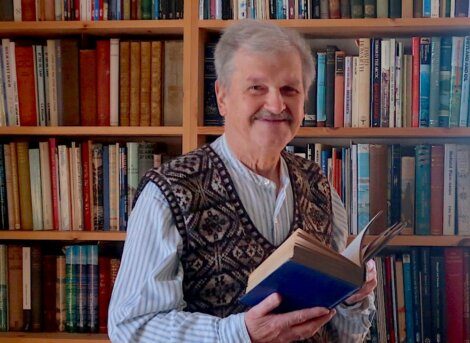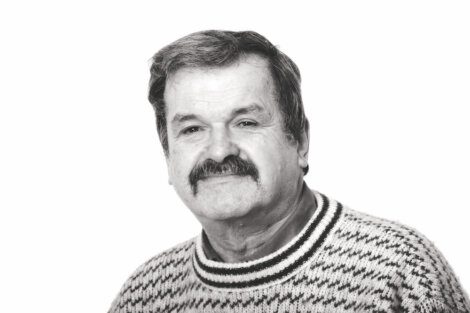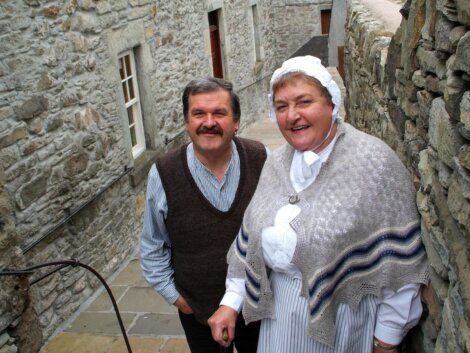Tributes / Douglas Sinclair (1943 – 2023): nurse teacher, tour guide and hugely respected Lerwick historian
DOUGLAS Sinclair’s earliest memory was of the great snow at the beginning of 1947. He, his father Captain Willie Sinclair, his mother Marion, and his sisters trudged from Nice Court, where Douglas was born in March 1943, to the Old Manse, a hundred yards away. The Sinclairs had bought it from Andrew Jamieson, the librarian. They lived there until 1965.
Douglas was a child of the Sooth End of Lerwick. Every now and again he popped back to see his great-aunt Mimie Robertson at Nice Court, to hear her reminiscences and to view her collection of old books and photographs.
The Sooth End was his playground, and as he grew up he interviewed neighbours and friends, people crammed with information about it. Among them were Auld Lowrie Smith of Twageos, boatbuilder; Fred Irvine, artist extraordinaire at Da Knowe; Beatrice Hunter at Irvinesgord; Tammie Moncrieff at Da Lodberrie.
He went to the Anderson Institute. He didn’t exert himself there as much as he wished later he had. He had many extraneous interests. Music was probably the greatest. He enjoyed listening to Sankey hymns with his father’s people at Whiteness. Eventually Ron Mathewson showed him some chords, and “Spew” Campbell gave him piano lessons.
In his late teens he joined the group The Midniters, and played piano for them at the Planets in Mounthooly Street: covers of Cliff Richards hits, jive and ballroom.
Captain Sinclair advised him against a career at sea. After leaving school Douglas applied for a job as a trainee welfare officer. He went to Glasgow to train, came back and was based at the old public assistance office at 64 St Olaf Street.
He often escorted mentally ill patients to Kingseat Hospital. He was skilled at that difficult job. As a result he was invited to train as a psychiatric nurse, and worked at Kingseat and the Royal Cornhill hospitals. He eventually moved on to undertake general nurse training, and worked in Aberdeen Royal Infirmary in the early seventies.
Readers of Douglas’s little book From Honky-tonks to Helicopters, published last year, may well have been surprised, as I was, to find out about the next stage in his career. He became the first Shetlander to work offshore in the oil industry, a medic on an oil rig. He began the first part of the job in Texas, and then crossed the Atlantic Ocean before drilling began in the North Sea.
He enjoyed the work, but the travelling became oppressive. After 18 months he resigned and came back to Lerwick. He became a staff nurse in the Gilbert Bain Hospital in January 1975. He transferred to the Brevik a few months later.
In due course he moved into nurse teaching: he qualified as a registered clinical nurse teacher at Foresterhill College in 1978 and took charge of the Shetland School of Nursing. “He made wis da nurses we became,” a pupil nurse of his told me. He married Margaret McKay in 1982. They stayed in Navy Lane in Lerwick, but had a house in Burra, where Douglas could usually be found among books.
Until he retired, Douglas played an active part in the life of the town. He was a member of Shetland Health Board for eight years, and chair of the Children’s Panel Advisory Committee for a short while.
His extra-curricular activities were vast. He was a volunteer at the Islesburgh exhibition for 15 years, and produced its useful historical booklet Islesburgh Exhibition, Shetland craft and culture: livin’ & life tinkin’.
He was a member of the Shetland Folk Society, and eventually its president. He took a particular interest in the Young Fiddler of the Year competition. His article about the society, published in Alex Cluness’s Dialect 04 (2005) is well-worth reading. He became a trustee at Shetland Amenity Trust in 1998, and continued in that role until 2015: one of its longest-serving members.
From 2006 until 2016 he was chair of the Shetland Family History Society.
When Douglas retired, early in 2001 (by then he was education, training and development manager with Shetland Health Board, and lecturer with the Robert Gordon University), he began a Ph.D. about medical facilities in Shetland during the 19th century, under the redoubtable Professor Ann Crowther. He laid it aside after a year, something that he regretted later.
But he didn’t give up studying the past, and in particular the history of Lerwick. One day he bumped into Malcolm Younger, and they arranged that he should write a column in the Shetland Post. Between 2002 and 2005 he contributed 40 articles, many of them about his old stamping ground at the Sooth End.
He began to visit the Shetland Archives. My colleagues and I will not forget his assiduous studies there. He pored over volumes of abridgments of sasines, not the most exciting source, or ordered out volume after volume of the valuation roll. In later years his eyesight deteriorated, but he persevered with the help of a powerful magnifying glass, and with much-appreciated assistance from Margaret.
After the Post became defunct, the Shetland Times Ltd signed him up to write a column for Shetland Life. One hundred more articles appeared. The result of all this writing was books: A Glimpse of Lerwick’s Waterfront History (2010) – the proceeds donated to charity – Old Lerwick, People and Places (2017) and Old Lerwick, Lanes and Lodberries (2021).
These works are noted for their accurate scholarship. They take us from Twageos to Whisky Lane; to almost-forgotten places like Muir’s Steps and Osy Anderson’s Pier; to the Hygienic Snack Bar (the Hi-Jinks), the Shetland Bookshop and the Fever Hospital.
They are the modern equivalent of Manson’s Lerwick During the Last Half Century (1923), another classic.
He didn’t sit at his desk all day. He became a registered tour guide, and devised his Walking Tours of Old Lerwick. He worked with Elma Johnson on her Island Trails. The tourist office and later Lerwick Port Authority employed him to visit cruise ships, to welcome and inform visitors. His earnest but gentle tones were ideal in that job.
He was particularly interested in connexions between Lerwick and Holland. He often took Dutch visitors to the cemetery, where some of their forebears are buried. A section of his Waterfront book deals with these fascinating Dutch links.
I had the privilege of discussing Douglas’s historical work with him on many occasions. He didn’t like vagueness. He came back to the archives time after time to try to firm up his hunches. I recall an occasion when I was on a walking tour in Orkney: my mobile phone rang. It was Douglas, He wanted to discuss the spelling of the word “lodberry” (that was the spelling he plumped for).
We never did work out where the “Bloodtub” was in Harbour Street …
- Douglas Sinclair, nurse teacher, local historian and tour guide, born in Lerwick 16 March 1943; died 20 August 2023
Brian Smith










